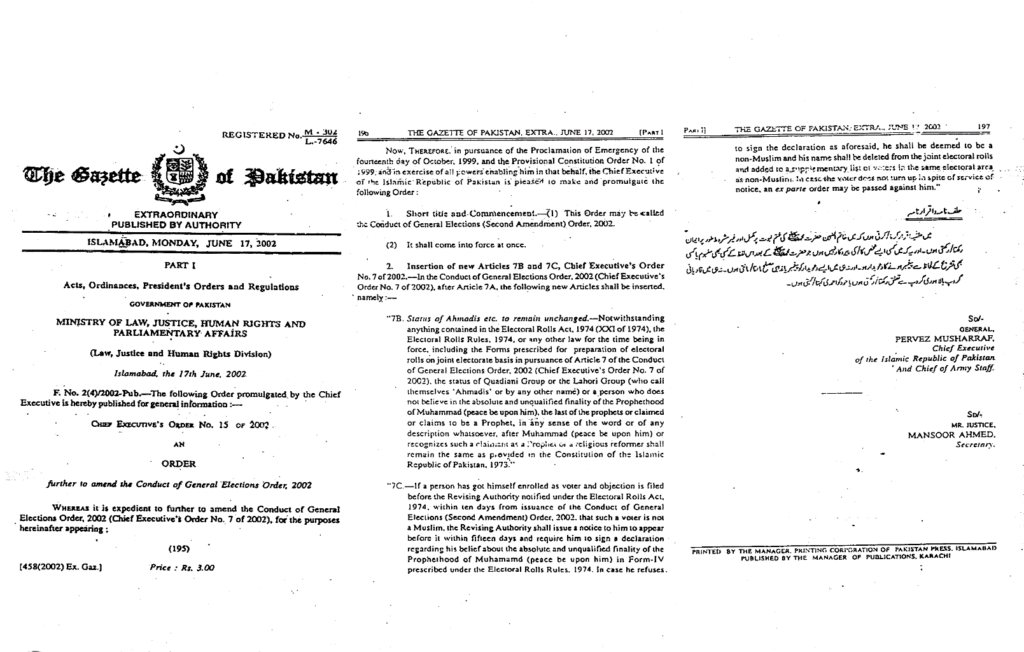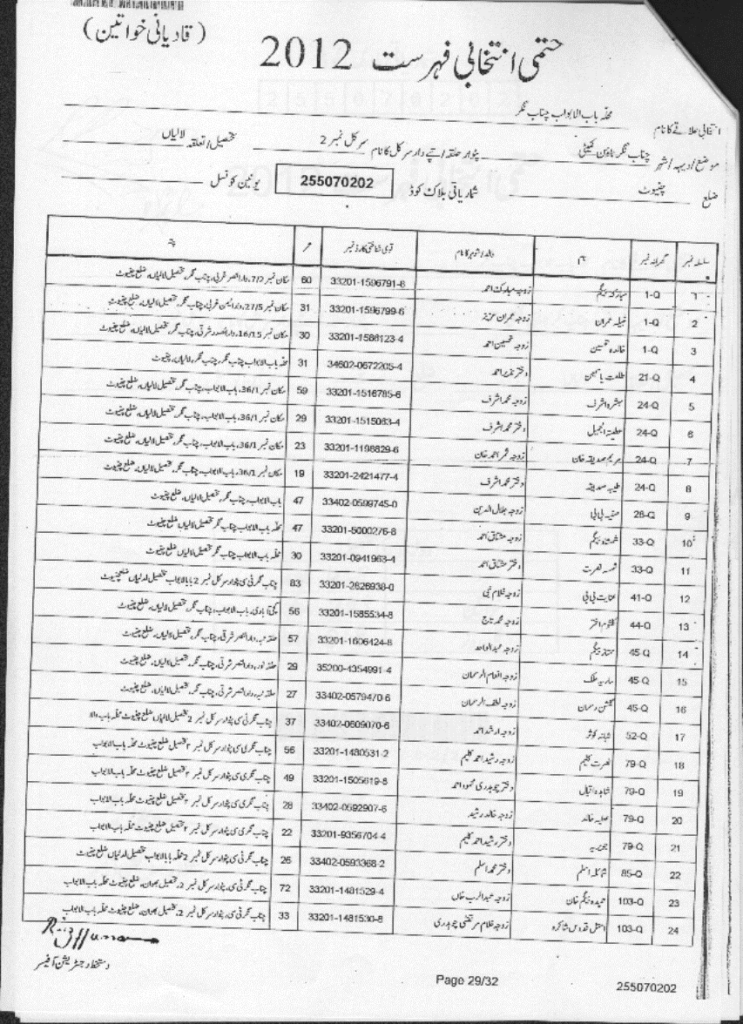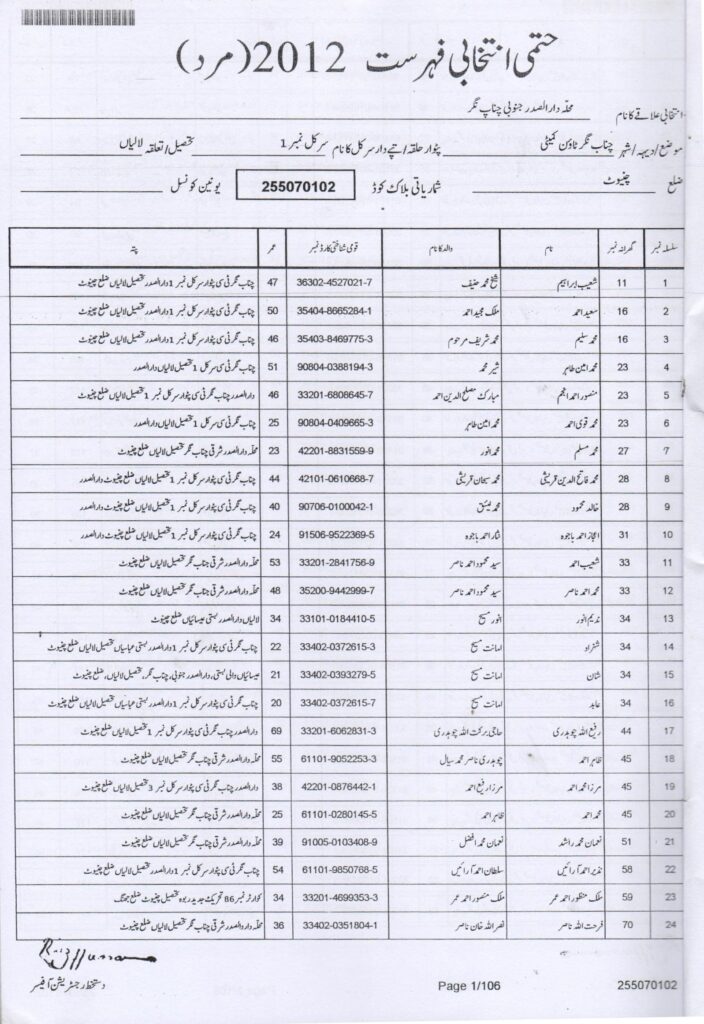Ahmadis remain deprived of their voting rights in Pakistan
VOTING RIGHT is a basic human right in a democracy. Ahmadis are denied this right by devious and discriminatory laws and rules in Pakistan. It is through unscrupulous rules and corruption of the electoral system undertaken by a hegemonic religious majority in the spirit of priest policy. Current rules flout religious pluralism assured by the founding father.
The electoral system has a history in Pakistan. From the inception of Pakistan in 1947 to the time of dictator Zia-ul-Haq, all the national elections to the provincial and national assemblies were conducted based on a joint electorate system. This was in line with the vision of the founding fathers of this nation and was duly enshrined in the 1973 Constitution. Ahmadis participated in elections like the rest of the population.
Zulfiquar Ali Bhutto (in power from 1971–1977) introduced a change by allocating a few additional seats to religious minorities in assemblies, over and above their normal rights in the general arrangement. As Ahmadis did not accept the imposed status of a non-Muslim minority, handed down to them in 1974 through Amendment No. II to the Constitution, they never availed these seats although there was an odd case whereby the government nominated a non-representative dummy as show-boy to fill the vacancy that was never requested nor accepted by the Ahmadiyya community.
General Zia-ul-Haq, in addition to his other disservices to the nation, imposed the system of a Separate Electorate for party-less elections in 1985. Since then, electoral lists have been prepared for different religious groups. Those who claim to be Muslim must sign a certificate of faith in ‘the end of prophethood’ and deny the veracity of the founder of Ahmadiyyat. The separate electorate system divided the Pakistani polity into numerous entities based on religion and did great damage to the first pillar of ‘Unity’ in the national motto of ‘Unity, Faith and Discipline’ given by the founding father Muhammad Ali Jinnah.
A separate electorate system has been maintained after Zia-ul-Haq by subsequent regimes. General Musharraf, pressed by the West, brought about some change in the system; however, he stopped well short of demolishing the system of separate electorate. There remains, however, an incorrect impression that Pakistan shifted from a Separate Electorate to a Joint Electorate system in the days of General Musharraf – actually, it did not. The Chief Executive’s Order No. 15 published in the Gazette of Pakistan (EXTRAORDINARY) issued in ISLAMABAD on JUNE 17, 2002, titled Conduct of General Elections (Second Amendment) Order, 2002, created a separate ‘supplementary list of voters’ in which Ahmadi voters were placed as ‘non-Muslim’.
In May 2002, when the system of the Joint Electorate was reintroduced, mullas raised some hue and cry. General Musharraf, obligingly, issued Chief Executive’s Order No. 15 whereby the status of Ahmadis etc. was to remain unchanged despite the Conduct of General Elections Order 2002. It also provided a procedure in Article 7C whereby Muslim voters were required to sign a declaration concerning belief about the absolute and unqualified finality of the Prophethood of Muhammad (peace be upon him) and those who refuse to sign the certificate were to be deleted from the joint electoral rolls and added to a supplementary list of voters in the same electoral area as non-Muslims (sic). So that was the de-facto end of the resurrected Joint Electorate system; there was no change from the old system of Separate Electorate – not for Ahmadis, anyway.
These discriminatory provisions contained as Articles 7B and 7C in the Chief Executive Order No. 7 of 2002 (as amended by C.E. Order No. 15) have now been made a part of the Election Act 2017. (See Annex and attached files) Similar provisions apply to local government elections.
These devious and appalling procedures predictably resulted in the disassociation of the Ahmadiyya community from elections. As such, for decades now, no Ahmadi has been represented in any assembly, national, provincial, district, or even local. Ahmadis have no representation in the town council of Rabwah, their town and centre where 95% of residents are Ahmadis.
For the next election in 2008, the Election Commission ordered vide its letter No. F.1(6)/2001-Cord dated 17 January 2007 that “the competent authority has been pleased to decide that separate supplementary lists of draft electoral rolls for Ahmadis/Qadianis for the electoral areas concerned, wherever they are registered, may be prepared and published….”
By 2017, a parliamentary committee undertook some revision of the main Electorate Rolls Act, 1974 and had the new Election Act 2017 approved in the Parliament. Again this Act required every candidate who claims to be Muslim to make a declaration of belief on oath. It is reproduced below. A similar declaration is required from all individuals who claim to be Muslim and apply for an Identity Card (CNIC) from NADRA, the authority that prepares voter lists from its records:
“I believe in the absolute and unqualified finality of the Prophethood of Muhammad (peace be upon him), the last of the prophets and that I am not the follower of anyone who claims to be a prophet in any sense of the word or of any description whatsoever after Prophet Muhammad (peace be upon him) and that I do not recognize such a claimant to be prophet or a religious reformer, nor do I belong to the Qadiani group or the Lahori group, or call myself an Ahmadi.”
The above statement and the like place Pakistan squarely in the time of medieval Europe. It is relevant to mention that the above definition of a Muslim, as adopted from Article 260(3) of the constitution is a Pakistan-specific innovation that is not to be found anywhere else in 1400 years since the birth of Islam. This is also true regarding the definition of a non-Muslim given in Art 260(3) b. The rulers, politicians and the mullas have steered the state of Pakistan into uncharted waters, in the middle of night.
Some may ask why Ahmadis do not simply go ahead and avail the voting right as provided. The answer is that no one who considers himself to be a Muslim would agree to dissociate himself from Prophet Muhammad (PBUH) to get registered as a voter. Ahmadis are no exception, as it is not possible for them also to do so in the light of their belief. The mulla and the authorities in Pakistan know fully well that Ahmadis would not vote under such conditions that corrupt their identity; that is why they have included such declarations in the law and rules.
The slogan of “free and fair elections” sounds meaningless to Ahmadi citizens of Pakistan. As for the right to participate in elections, it is guaranteed to Ahmadis in the Constitution of Pakistan and Article 21 of the Universal Declaration of Human Rights to which Pakistan is a signatory. Denial of this right is a gross violation of these sacrosanct provisions.
National elections were held in 2008 and 2013. Ahmadis could not participate in the face of these special conditions applicable to them. After the 2013 election, a revision of election laws was undertaken by the parliament in which PML-N led by Mian Nawaz Sharif was the majority ruling party. On October 2, 2017, the parliament passed the Elections Act 2017 into law. According to the new law, Ahmadis could vote as they were no longer required to fill in application forms to register as voters. This greatly upset the mullas, as well as the opposition who were not happy with some PML(N)-sponsored specific provisions like a disqualified person becoming the president of his political party. The anti-ruling party groups availed the occasion to start a virulent agitation against the government, with a focus on the doctrine of the End of Prophethood. The ruling party immediately capitulated on the issue of the voting rights of Ahmadis and incorporated the notorious Articles 7B and 7C of the amended C.E. Order No.7 of 2002 in the Election Act 2017. Thus, Ahmadis were again denied their right to vote. The government, to calm the agitators, claimed: “The ‘end of prophethood’ law is now far more effective and binding than before.” The Interior Minister stated that the new Act on the ‘End of Prophethood’ will remain operative till Qiyamat (Doomsday).
The discriminatory Elections (Amendment) Act 2017 is the Pakistani version of Gore Vidal’s “Perpetual War for Perpetual Peace”; the state policy here is “Perpetual Denial of Human Rights to Ahmadis, for Perpetual Political Self-interest”. The revised Act violates the clear guidance of the founding father of Pakistan; it defies higher values of statecraft and transgresses the international protocols signed by Pakistan. It manifests abuse of religion for political gain. Ahmadis were effectively disenfranchised; they could not participate in the General Elections in 2018, or 2024.
The language of the religious affidavit is noteworthy. The inquisitors of the medieval Spanish Inquisition would not have been more thorough in the preparation of their affidavits. The Election Commission now issues separate lists of Ahmadi voters along with their addresses; this makes it easy for anti-Ahmadi terrorists and activists who are thus provided a ready list with the needed information. In every future election, the Election Commission will provide them with an updated list. This is a cause of serious concern to Ahmadis. Religious bigots and extremists have, on record, made use of these lists.
Thus, 40 years after Zia’s harmful innovation, Ahmadis continue to have no representation in the federal parliament or the provincial assemblies – nor the local councils, even in Rabwah; as a result, Ahmadis’ political and civic rights are grossly neglected, even violated at all levels in the country.
PTI, led by Imran Khan, came to power in 2018, on the promise of ‘Change’; however, it brought about no change in the denial of voting rights to Ahmadis. According to the 2018 report of the EU Electoral Observer Mission: “Although steps were taken to ensure participation of minorities in the electoral process, the situation of the Ahmadi community remains unchanged. They are still registered on a separate electoral roll, contrary to constitutional provisions on the equality of citizens and against international law.” The same situation prevailed in the recent 2024 elections.
In July 2023, the government got numerous amendments approved to the Elections Act. However, an amendment to facilitate Ahmadis’ voting rights in a genuine joint electorate was not even considered. Deliberate disregard of moral, social and societal norms by the Pakistani state and society regarding Ahmadi citizens is extraordinary, highly undesirable, and, of course, harmful.
October 11, 2024

Annexure B: Copies of Excerpts of a separate list of Ahmadi voters along with their addresses

